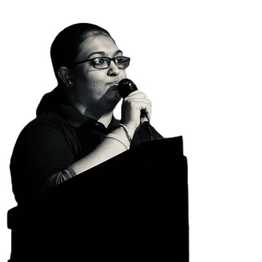Bhuvana Meenakshi Koteeswaran

Bhuvana Meenakshi Koteeswaran is a Socio-tech Researcher and founder of Women In Tech collectives, India, she is also Internationally recognised as a Mozillian, Wikimedian, and VRAR/ multidimensional space enthusiast. She is one of the recipients of the ShuttleWorth Flash Grant awards 2021. Bhuvana initiated the Women In Tech community in India to enable more voices of women who are interested in pursuing a career in tech or want to learn tech and to give opportunities for those who lost their careers in tech due to the pandemic. As part of this initiative, she has joined hands with Coko Foundation where the organisation has collaborated to support the members of the community in furthering their careers and interest in advance technologies. She is the cofounder of EmergeAbility, an initiative to make the digital world inclusive and accessible. She has also facilitated global events like MozFest, and Hack4OpenGLAM. She had been a mentor at Creep-a-thon hosted by Codam college, Amsterdam. She was one among the International Jury panel for the Wikipedia Pages wanting Photos campaign 2021. Bhuvana being curious to reach the global technologies and communities so she collaborated with the CityJS London team and initiated its first ever World series version in the steel city of India, Salem. She is the founder and lead the team of CityJS India 2022 with an intention connect developers and technology enthusiasts from India and all around the world. She also balances her life by pursuing performing arts, she has received Merit certificates from Annamalai University and Imperial Society of Teachers of Dancing, London for her notable participation in Bharatnatyam and Kathak dance forms.
Creating accessibility environments to help diverse participation in tech
11/26/2022, 14:15 - 14:45
Track B
Spoken language: en
Slide language: en
In this talk I would like to highlight about what application developers who use JavaScripts can add accessibility to their agenda. Creating checklists, understanding end users and targeting diverse audiences all leads to success of an application or product. The very understanding of these accessibilities needs from a Neurodivergent perspectives is what I would like to emphasize on. A web page containing JavaScript will typically be fully accessible if the functionality of the script is device independent (does not require only a mouse or only a keyboard) and the information (content) is available to assistive technologies. There is no easy fix that can be applied to solve all accessibility problems associated with JavaScript. The only way to ensure JavaScript accessibility is by evaluating each page that utilizes scripting and devising a unique solution to any accessibility problem found. I would like to recommend a handy cheatsheet or checklist which I have been working on which can ease the evaluation process for the developers. Understanding the grassroot problems and addressing the needs of it technically is what can help in resulting great tools and products for the future. I strongly believe that accessibility is no more a feature but an essential component of a product that needs to be considered even before the development.